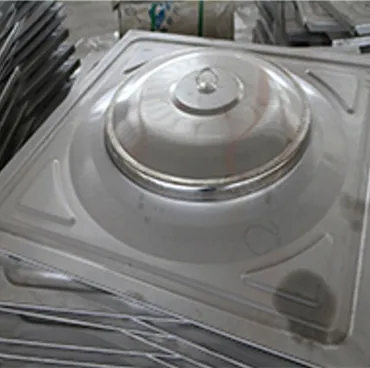loading...
- No. 9, Xingyuan South Street, Dongwaihuan Road, Zaoqiang County, Hengshui, Hebei, China
- admin@zjcomposites.com
- +86 15097380338
- Welcome to visit our website!
fiberglass floor grating
The Versatility and Advantages of Fiberglass Floor Grating
In the world of industrial flooring solutions, fiberglass floor grating has emerged as a highly valued option due to its unique blend of strength, durability, and versatility. This innovative material is composed of fiberglass reinforced plastic (FRP), which gives it a superior resistance to corrosive environments, making it an ideal choice for a wide variety of applications. From chemical plants to commercial kitchens, fiberglass floor grating is proving to be an indispensable asset in many sectors.
Exceptional Strength and Durability
One of the standout features of fiberglass floor grating is its exceptional strength-to-weight ratio. Unlike traditional steel grating, which can be cumbersome and prone to rust, fiberglass grating is lightweight yet strong enough to support heavy loads. This characteristic is particularly advantageous in environments subject to frequent heavy traffic or machinery, as it provides a stable footing without the excess weight that can bog down structural supports.
Moreover, fiberglass is inherently resistant to corrosion. Many industrial sites are exposed to harsh chemicals, moisture, and extreme temperatures. Fiberglass grating does not rust, rot, or corrode, offering a long-lasting solution that can withstand these demanding conditions. Its longevity not only reduces the need for frequent replacements but also minimizes downtime typically associated with flooring maintenance.
Safety Features
Safety is paramount in any workspace, and fiberglass floor grating excels in this regard. The surface of the grating can be designed with various patterns, including anti-slip textures, which significantly reduces the risk of slips and falls. This feature is particularly important in environments that are often wet or where spills are common, such as food processing plants or laboratories.
In addition to its slip-resistant properties, fiberglass grating is lightweight and easy to handle, allowing for safer installation and maintenance. Its non-conductive nature is also a significant advantage in electrical environments, ensuring a safer workspace for employees.
fiberglass floor grating

Versatile Applications
Fiberglass floor grating can be found across various industries and applications. In petrochemical facilities, it is often used in walkways and platforms where traditional materials would fail against corrosion and chemical exposure. Its lightweight nature allows for ease of installation on elevated structures, making it a preferred choice in oil rigs and refineries.
In wastewater treatment plants, fiberglass grating is a standard due to its ability to endure corrosive liquids and harsh environmental conditions. Likewise, in food processing environments, it aids in maintaining a clean and safe floor surface, which is essential for compliance with health regulations.
Eco-Friendly Solution
As industries across the globe strive for more sustainable solutions, fiberglass floor grating also presents an environmentally friendly option. It is often manufactured from recycled materials and contributes to lower energy consumption in production compared to other materials. Additionally, its long lifespan helps reduce the overall environmental impact associated with manufacturing and disposing of flooring materials.
Conclusion
In summary, fiberglass floor grating is a remarkable flooring solution that combines strength, durability, safety, and versatility. Its resistance to corrosion and easy maintenance make it a practical choice for demanding industrial environments. As industries continue to look for materials that cater to both operational efficiency and safety, fiberglass grating stands out as a clear winner. Whether used in chemical plants, food processing facilities, or construction sites, fiberglass floor grating is likely to remain a crucial element in modern industrial applications for years to come.
-
The Rise of FRP Profiles: Strong, Lightweight, and Built to LastNewsJul.14,2025
-
SMC Panel Tanks: A Modern Water Storage Solution for All EnvironmentsNewsJul.14,2025
-
GRP Grating: A Modern Solution for Safe and Durable Access SystemsNewsJul.14,2025
-
Galvanized Steel Water Tanks: Durable, Reliable, and Ready for UseNewsJul.14,2025
-
FRP Mini Mesh Grating: The Safer, Smarter Flooring SolutionNewsJul.14,2025
-
Exploring FRP Vessels: Durable Solutions for Modern Fluid HandlingNewsJul.14,2025
-
GRP Structures: The Future of Lightweight, High-Performance EngineeringNewsJun.20,2025
